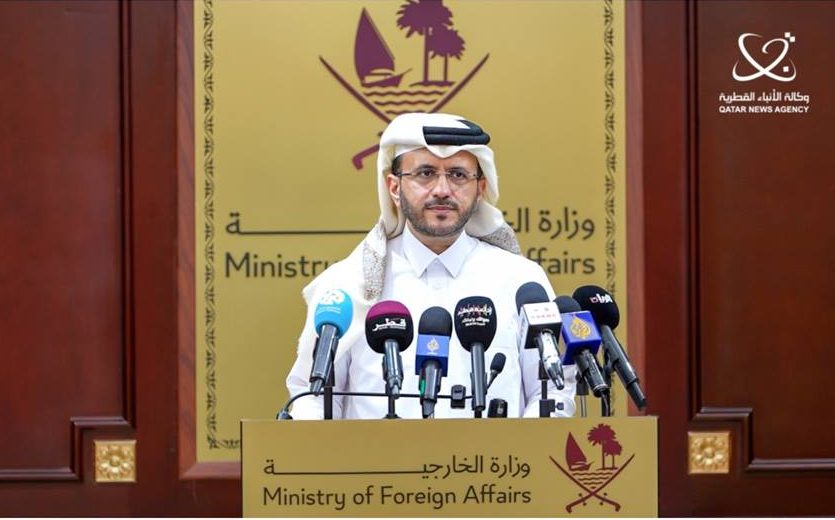Qatar’s Foreign Ministry spokesperson reaffirms Hamas’s political bureau’s presence in Doha as beneficial for mediation efforts amid reports suggesting pressure for relocation.
Qatar’s Foreign Ministry spokesperson Majed Al-Ansari maintained that the presence of Hamas’s political bureau in Doha was useful in mediation efforts following reports pointing to the group being pressed to relocate from the Gulf country.
“As long as their presence here in Doha, as we have always said, is useful and positive in this mediation effort, they will remain here,” Al-Ansari told a weekly press briefing in Doha.
Doha has hosted the Hamas political bureau since 2012 in response to Washington’s request to maintain a channel of communication. This has proven vital in previous and current mediation efforts in Gaza.
A report by the Wall Street Journal on Saturday claimed that Hamas’s political leadership were looking to move from Qatar as the ceasefire talks stalled and amid pressure from the United States on the Gulf country.
Citing Arab officials, the report said the group spoke to “at least two countries in the region” to host their office instead, echoing claims made by Western outlets over the past months.
However, Hamas denied the claims hours after the WSJ article was published. In a video interview with Al Jazeera, Mohammed Nazzal, a member of the Hamas political bureau, denied the reports and said they were mere rumours.
Meanwhile, Qatar has repeatedly stressed that its role as a mediator does not entail applying pressure on any of the parties involved.
As a heavyweight diplomatic power, Qatar last year, alongside Egypt, mediated a truce that lasted between November 24 and December 1. The truce led to the release of at least 109 captives from Hamas in Gaza.
Talks have since stalled and the war reached its 200th day, with more than 34,000 killed in Gaza.
Despite Qatar’s past and ongoing crucial mediation efforts, it has been on the receiving end of criticism by Israeli officials, including Prime Minister Benjamin Netanyahu, and American diplomats.
This was seen in January when Netanyahu described Qatar’s mediating position as “problematic” in leaked audio recordings. Netanyahu then said he stood by his inflammatory remarks.
Then on April 4, Israel’s economy minister Nir Brakat accused Qatar of being “untrustworthy” and “a threat to peace” in the world in an interview with Bloomberg.
On April 17, Qatar’s Prime Minister Sheikh Mohammed bin Abdulrahman Al-Thani called out the “exploitation and abuse” of his country’s diplomatic efforts and said Doha is “re-evaluating” its mediation role.
“Unfortunately, we have seen that there is a misuse of this mediation for narrow political interests, and this necessitated the State of Qatar to carry out a comprehensive evaluation of this role[…] and evaluate how all parties engage in this mediation,” Sheikh Mohammed, who is also Qatar’s foreign minister, said at the time.
Sheikh Mohammed’s remarks raised further questions on the status of the negotiations by the press during the briefing in Doha on Tuesday.
Al Ansari maintains that Qatar is still reassessing its mediation role, a move that he said was prompted by attacks from Netanyahu’s government.
“They all know what the Qatari role is, its nature, and its details during the previous stage and they lied,” he told the press.







